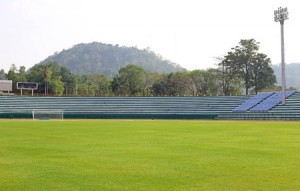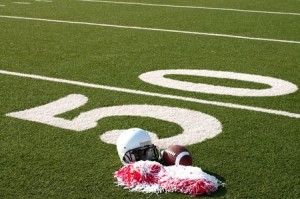Poorly maintained fields increase concussion risk
When it comes to concussions, does it matter what type of field the athletes are playing on?
 Head injuries and life-threatening conditions such as CTE (chronic traumatic encephalopathy) in athletes, especially football players, have been getting lots of (long overdue) attention in recent years. In an effort to help protect players, we’ve seen sports leagues, coaches, trainers, medical professionals, and equipment manufacturers work to make the games safer — a better helmet design, teaching safer tackling techniques, greater enforcement of game rules, and earlier detection of head injury to avoid repeated blows. Little attention has been paid to the actual playing surface, even though 1 in 5 concussions involve a head-to-surface collision.
Head injuries and life-threatening conditions such as CTE (chronic traumatic encephalopathy) in athletes, especially football players, have been getting lots of (long overdue) attention in recent years. In an effort to help protect players, we’ve seen sports leagues, coaches, trainers, medical professionals, and equipment manufacturers work to make the games safer — a better helmet design, teaching safer tackling techniques, greater enforcement of game rules, and earlier detection of head injury to avoid repeated blows. Little attention has been paid to the actual playing surface, even though 1 in 5 concussions involve a head-to-surface collision.
A recent study by the Concussion Legacy Foundation urges athletic organizations and groundskeepers to treat the field with the same care as they would any other piece of valuable equipment or safety technology, as the condition of the playing surface can seriously threaten player safety. This is especially true of turf fields, primarily because they are more likely to be neglected.
 Synthetic turf fields have many draws that make them an increasingly popular choice for high schools, colleges, and other sports facilities. They don’t need to be seeded, fertilized, or mowed like grass fields do, and they can be used in all types of weather. They can be used far more frequently than a grass field can be, though they will wear out after about 10 years. With proper upkeep, synthetic fields are as safe as natural ones. But, therein lies the trouble, as many facilities don’t properly maintain their turf, and that’s when they can become dangerous.
Synthetic turf fields have many draws that make them an increasingly popular choice for high schools, colleges, and other sports facilities. They don’t need to be seeded, fertilized, or mowed like grass fields do, and they can be used in all types of weather. They can be used far more frequently than a grass field can be, though they will wear out after about 10 years. With proper upkeep, synthetic fields are as safe as natural ones. But, therein lies the trouble, as many facilities don’t properly maintain their turf, and that’s when they can become dangerous.
Made of sand, rubber pellets, and plastic fibers on gravel, turf fields need to be raked and tilled to prevent the material from getting too hard. Rubber pellets will need to be replaced in areas that become worn and degrade over time. The maintenance is not terribly arduous, but in many cases it is not being done. Artificial turf fields are marketed as “maintenance-free,” and they do appear to be in good shape, even when they are not. After having spent hundreds of thousands of dollars on a field, many establishments simply don’t want to continue to pay to have the thing taken care of. But, as DMA Sports Design representative Joe DiGeronimo put it, “even a Mercedes needs oil.” More to the point, it is irresponsible and unacceptable for a school or other establishment to allow players to use a field that isn’t being maintained properly.
If you or your child have been hurt in a park or a facility that has been poorly maintained or is in bad condition, contact a premised liability lawyer at Munley Law Personal Injury Attorneys for a free evaluation of the details of your case. We will answer your questions and help you determine what to do next. We can be reached day or night at 855-866-5529.
Posted in Personal Injury.
Tagged Concussion Liability









